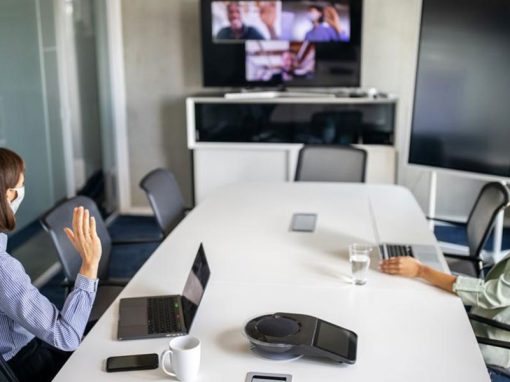The Enlarged Board of Appeal (EBA) of the EPO has accepted the referral from Technical Board of Appeal 3.5.02, raised with respect to case T1807/15, regarding the legality of Oral Proceedings held by videoconference (ViCo) without the consent of the parties. Oral Proceedings have been scheduled for 28 May 2021, and will be conducted by ViCo! Nevertheless, according to the Notice from the EPO dated 24 March 2021, the message from the President of the EPO is clear: it’s business as usual with respect to Oral Proceedings before Examining and Opposition Divisions.
The context of the referral
The parties to the proceedings in T 1807/15 were originally summoned to in-person Oral Proceedings scheduled for 3 June 2020. Due to the COVID-19 pandemic, the Oral Proceedings were postponed to 8 February 2021.
On 8 January 2021, the Patentee requested that the Oral Proceedings be postponed further due to the ongoing pandemic and the travel restrictions in place between the UK and Germany.
Despite the above request, by Communication dated 20 January 2021, the parties were informed that the Oral Proceedings would be held by videoconference (ViCo) and the Oral Proceedings took place on 8 February 2021.
During the Oral Proceedings, the appellant (Opponent) requested that the following question be referred to the EBA:
“whether oral proceedings under Article 116 EPC can be replaced by a videoconference without the parties’ consent?”
(translation from German to English)
Before any substantive issues were dealt with, the Board announced its decision to refer a question to the EBA.
The decision of the Board in T 1807/15
On 12 March 2021, the decision of the Board in T 1807/15 was issued providing followers with an eye for detail with the reasoning behind the Board’s referral.
As an initial comment, from point 2 of the Reasons it is clear that the referring Board considered the question proposed by the appellant to relate to a point of law of fundamental importance. As many readers will appreciate, it is certainly a topic that has the potential to affect a very large number of cases.
Turning to more substantive matters, in point 5 of the Reasons, the Board considered the meaning of the term “oral proceedings” in Article 116 EPC. When considering the meaning of the term “oral proceedings”, the Board considered (i) the relevant case law of the Boards of Appeal, (ii) the literal and systematic interpretation, (iii) the travaux préparatoires, (iv) the teleological interpretation, (v) subsequent agreements or practice and (vi) the dynamic interpretation.
The conclusions of the Board with respect to each of (i) – (vi) were as follows:
- The issue of whether Article 116 EPC stipulates requirements for the format of oral proceedings and, if so, what they are, does not appear to have been properly clarified in the case law.
- From a literal interpretation, it appears that Article 116 EPC stipulates the right of the parties to be heard at in-person oral proceedings.
- The travaux préparatoires would appear to support the result of the literal interpretation.
- Under a teleological assessment, ViCo could be deemed to fulfil the purpose of providing an opportunity to present oral comments as long as they gave the parties the equivalent chance to present their arguments orally as they would have at oral proceedings in the traditional form. However, it is doubtful whether the method of teleological assessment is applicable to the present situation.
- The Board is unaware of any subsequent agreements among all contracting states that could affect the interpretation of Article 116 EPC.
- The dynamic interpretation approach, as set out in G 3/19, was acknowledged by the Board but they questioned its relevance to the present case.
G 1/21
The question to be referred:
Is the conduct of oral proceedings in the form of a videoconference compatible with the right to oral proceedings as enshrined in Article 116(1) EPC if not all of the parties to the proceedings have given their consent to the conduct of oral proceedings in the form of a videoconference?
On 17 March 2021, Summons to Oral Proceedings were issued to the respective parties in case T 1807/15. The Summons to Oral Proceedings states that the proceedings will take place on 28 May 2021 at 09:00 via ViCo.
Notably, towards the end of the Summons, the EBA noted as follows:
“Should the parties to the appeal proceedings in case T 1807/15 before Technical Board of Appeal 3.5.02 consider oral proceedings before the Enlarged Board not to be expedient and/or envisage not to attend the oral proceedings, which have been arranged as a precautionary measure under Article 14(1) RPEBA, they are invited to inform the Enlarged Board accordingly”
In that case, a decision on the points of law referred to the Enlarged Board could be promptly issued.”
The appellant who initially requested that a referral be made to the EBA withdrew their request after the Oral Proceedings took place on 8 February 2021. As such, it may be the case that the parties chose not to attend the Oral Proceedings and a decision is issued fairly promptly, providing the legal certainty needed to parties currently involved in proceedings which look set to be held by ViCo.
Notice from the EPO dated 24 March 21
On 24 March 2021, a Notice from the EPO was published concerning the conduct of Oral Proceedings in Examination and Opposition in view of referral G 1/21.
The Notice is short: whilst acknowledging the referral, the President of the EPO, with an apparent eye on guaranteeing access to justice and ensuring the functioning of the EPO, has decided that Oral Proceedings before Examining and Opposition Divisions will continue to be held by ViCo without requiring the agreement of the parties.
Of course, parties to Oral Proceedings set to be held via ViCo without their consent may still chose to request a stay of proceedings but it remains to be seen whether such requests will be generally allowed or generally denied.
Our website will be updated when further information become available.
Share this article
Our news articles are for general information only. They should not be considered specific legal advice, which is available on request.









